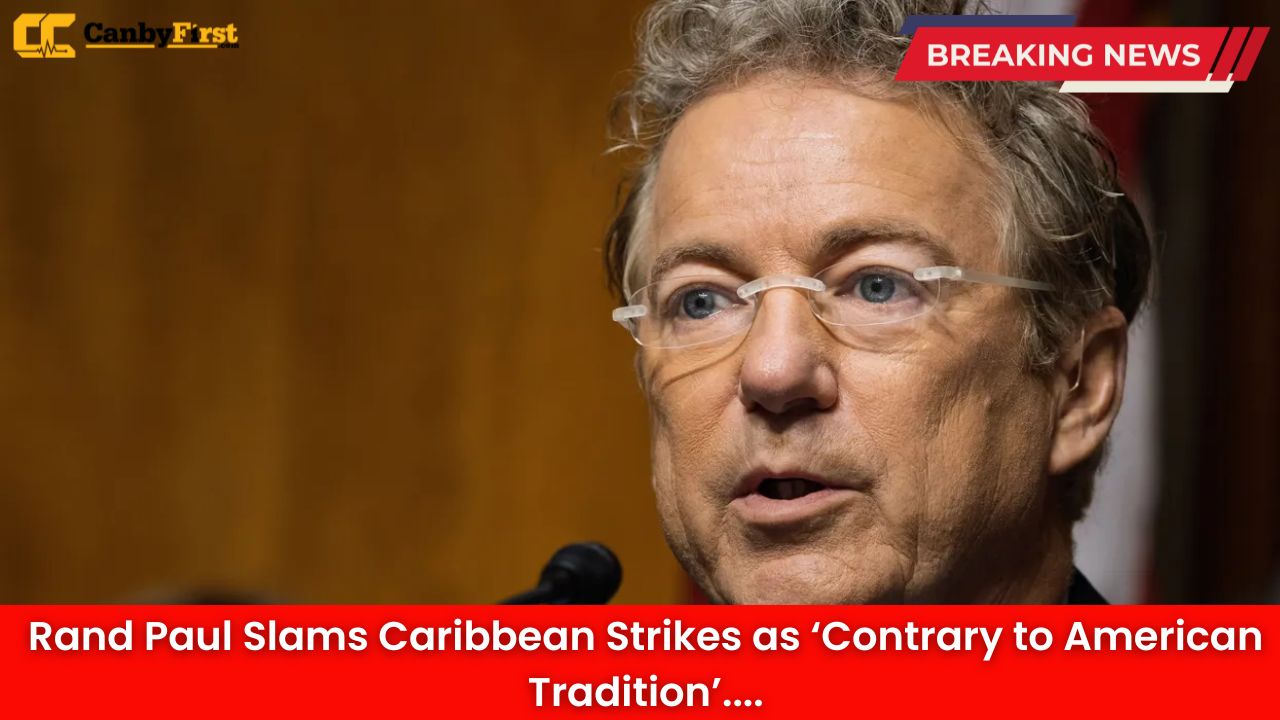Washington, US:
Kentucky Senator Rand Paul sharply criticized the recent US air and naval strikes in the Caribbean, calling them “reckless, unconstitutional, and a dangerous overreach of executive power.” The remarks came during a press conference on Capitol Hill on Monday, where Paul expressed deep concern that President Trump’s recent military actions in the region “go against all of our tradition,” referring to America’s longstanding practice of avoiding undeclared foreign interventions.
Paul, a leading voice of libertarian conservatism and a consistent critic of foreign military entanglements, warned that such actions could escalate tensions in the Western Hemisphere and undermine the constitutional balance of power between Congress and the presidency.
Also Read
“These strikes, while framed as defensive and humanitarian, carry enormous risk,” he said. “Our founders made clear that no president should unilaterally launch military attacks without explicit congressional approval. This is not in line with the tradition of restraint that defines American foreign policy at its best.”
Background: A Rapid Crisis in the Caribbean
The controversy erupted after the US military confirmed weekend air and naval operations targeting suspected cartel-linked installations and armed groups in the Caribbean Basin. Defense officials framed the strikes as part of a “precision intervention” to protect US interests, personnel, and maritime security amid rising regional instability.
Reports indicate that the operations focused on intercepting militant activities near key trade corridors and preventing the smuggling of arms and narcotics, which Washington claims have intensified in recent months. However, limited details were released about the specific targets or the duration of the mission.
The Pentagon has maintained that the operation was conducted “in coordination with regional allies” and under clear defense authorizations related to counterterrorism and anti-narcotics activities. Critics like Paul, however, argue that such justifications represent a troubling expansion of presidential war powers.
Paul’s Constitutional Argument
Senator Paul reiterated that Congress bears the sole authority to declare war under Article I of the U.S. Constitution, stressing that executive-led strikes without a formal declaration violate both constitutional law and historical precedent.
“Our tradition, from Washington to Eisenhower, was built on caution and deliberation,” Paul told reporters. “We are not meant to police the world—especially not without debate, transparency, and accountability.”
He further argued that labeling military engagements as “counterterrorism actions” or “defensive measures” has become a loophole for circumventing Congress.
“When presidents start calling every foreign strike ‘defensive,’ we lose constitutional grounding,” he said. “That’s the path to endless conflict, not national security.”
Divided Reactions Within the GOP
Paul’s comments highlight growing divisions among Republican lawmakers regarding the administration’s expanding military footprint. While foreign policy hawks within the party have supported President Trump’s decision, citing increasing threats to regional stability and trade, isolationist and libertarian Republicans have voiced unease over what they see as mission creep.
Senator Lindsey Graham defended the strikes, arguing that the Caribbean operations were “limited, targeted, and consistent with defending U.S. interests.” Others, including some House members, called for classified briefings to clarify objectives and ensure compliance with the War Powers Resolution.
Former defense officials have also weighed in, noting that “gray zone operations,” such as maritime interdictions and drone strikes, often blur the lines between combat and law enforcement, challenging existing oversight mechanisms.
Democratic Response: Support with Conditions
Across the aisle, leading Democrats offered measured support, though with strict calls for transparency. Senate Foreign Relations Committee Chair Bob Menendez stated that while he understood the need to protect U.S. assets, “the American people deserve to know why these targets were struck and what our long-term strategy is.”
Progressive lawmakers, including Representatives Ilhan Omar and Ro Khanna, joined Paul in condemning the move as unconstitutional. “We cannot normalize unauthorized military actions just because they happen close to home,” Omar said in a statement.
A Broader Debate on Executive Power
The dispute has reignited broader debate on presidential war authority—a recurring issue in American politics since the early 2000s. Successive administrations have invoked various justifications to conduct military operations overseas without a formal war declaration, often citing post-9/11 security authorizations.
Paul has repeatedly pushed for legislation curbing such powers. His earlier proposals sought to repeal outdated authorizations for use of military force (AUMFs) passed in 2001 and 2002, which critics say provide presidents with a blank check to conduct global military operations without new congressional approval.
“This debate isn’t just about the Caribbean,” Paul emphasized. “It’s about whether we are a republic governed by laws or a presidency governed by impulses.”
White House Defense of the Policy
In response to growing criticism, the White House issued a statement defending the strikes as “necessary and proportionate actions to protect American interests and prevent wider instability.” The statement affirmed that President Trump acted on intelligence assessments indicating imminent threats to U.S. vessels and citizens in the region.
Administration officials underscored that the operations were conducted “with precision, in coordination with local partners, and under the President’s duty to defend the nation.”
When asked whether the President consulted congressional leaders before authorizing the strikes, White House spokesperson Sarah Matthews declined to provide specifics, citing operational security.
Regional Implications and Diplomatic Fallout
Analysts warn that the strikes could strain relations with Caribbean governments if not properly explained. Some regional leaders expressed unease over the unilateral nature of the operation, emphasizing respect for sovereignty and rule of law.
Caribbean Community (CARICOM) officials have requested formal clarification from Washington, urging dialogue over escalation. “The Caribbean should not become another theater for power projection,” one ambassador told reporters in Georgetown.
At the same time, intelligence experts note that transnational criminal networks have increasingly exploited weak governance and maritime trade channels, creating what some describe as a “shadow conflict” in the Americas. U.S. officials argue that greater intervention is necessary to prevent those groups from threatening regional security.
The Road Forward
Paul’s remarks signal that the administration may face bipartisan pressure to justify the legality of these operations in upcoming congressional hearings. Lawmakers from both parties are now calling for a classified briefing and a possible review of the legal framework governing counter-narcotics and anti-terror missions abroad.
For Paul, the issue is larger than any single strike. It reflects a deeper concern about preserving America’s constitutional checks and balances. “Ending endless wars was a promise made to the American people,” he said. “It should also be a principle we uphold—not abandon when it becomes inconvenient.”
FAQ
What prompted the U.S. strikes in the Caribbean?
Defense officials claim the strikes targeted armed and criminal groups threatening U.S. maritime and trade interests in the region.
Why is Rand Paul opposing them?
Paul argues that the actions were taken without congressional approval, contradicting constitutional and traditional limits on presidential war powers.
Has Congress authorized these operations?
No formal authorization has been announced. The administration cites existing defense authorizations and executive powers.
How have other politicians reacted?
Responses are mixed—hawks support the move as necessary, while libertarians and progressives denounce it as unconstitutional.
What happens next?
Both the Senate and House are expected to hold hearings seeking greater transparency on the intelligence, legal basis, and long-term plan for U.S. involvement in the Caribbean region.












